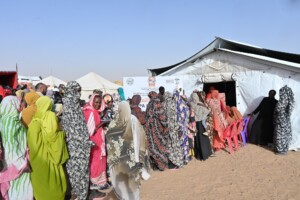El Niño effect on livestock may lead to more food insecurity in Sudan
The below-average rainfall across many of Sudan’s traditional rain-fed areas during the June-October rainy season has resulted in limited pasture and water availability and an increased risk of animal diseases.
Findings from a recent Food and Agriculture Organization (FAO) livestock assessment conducted in 72 Sudanese localities found that smallholder pastoral families in Darfur, West and South Kordofan, Kassala, Red Sea and El Gedaref states are among those at greatest risk of livestock losses due to El Niño weather patterns.
The below-average rainfall across many of Sudan’s traditional rain-fed areas during the June-October rainy season has resulted in limited pasture and water availability and an increased risk of animal diseases.
Findings from a recent Food and Agriculture Organization (FAO) livestock assessment conducted in 72 Sudanese localities found that smallholder pastoral families in Darfur, West and South Kordofan, Kassala, Red Sea and El Gedaref states are among those at greatest risk of livestock losses due to El Niño weather patterns.
This may increase food insecurity in these areas, especially among the poor smallholder families who rely on livestock for their food and income, the UN Office for the Coordination of Humanitarian Affairs (OCHA) in Sudan reported in its latest weekly bulletin.
In response, FAO is seeking $4 million to assist 92,000 families (about 520,000 people) in Sudan who are facing increased risk of food insecurity and malnutrition because of El Niño’s impact on livestock.
The funding appeal is a part of the 2015 Sudan Humanitarian Response Plan, however, interventions will continue to be needed in January-April next year. With these funds, families will be provided with animal feed, water access, and vaccination and treatment services to enable them to keep their animals healthy, and ensure that families have access to meat and milk during the winter season.
Healthy animals produce up to 60 percent more meat and milk for vulnerable families, according to FAO. The sale of surplus meat and milk is also an important source of income that helps rural families meet their basic needs. Supporting vulnerable families to pursue their livelihoods is an important way to mitigate the impacts of the rainfall shortage and to avoid increased food insecurity over the 2016 lean season.
According to the UN Environment Programme (Unep) 2012 report 'On the Hoof', livestock accounts for more than 60 percent of Sudan’s agriculture contribution to the Gross Domestic Product.











 and then
and then